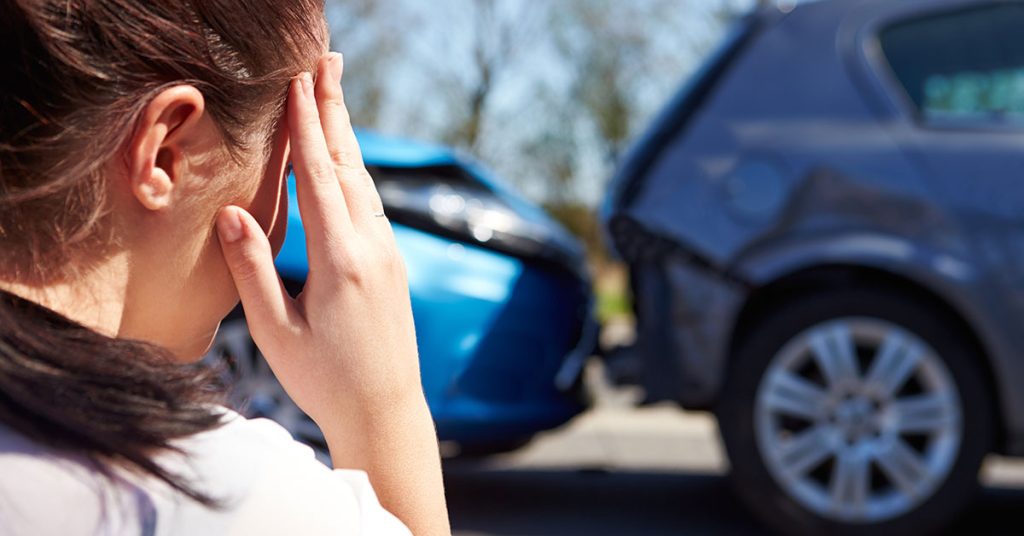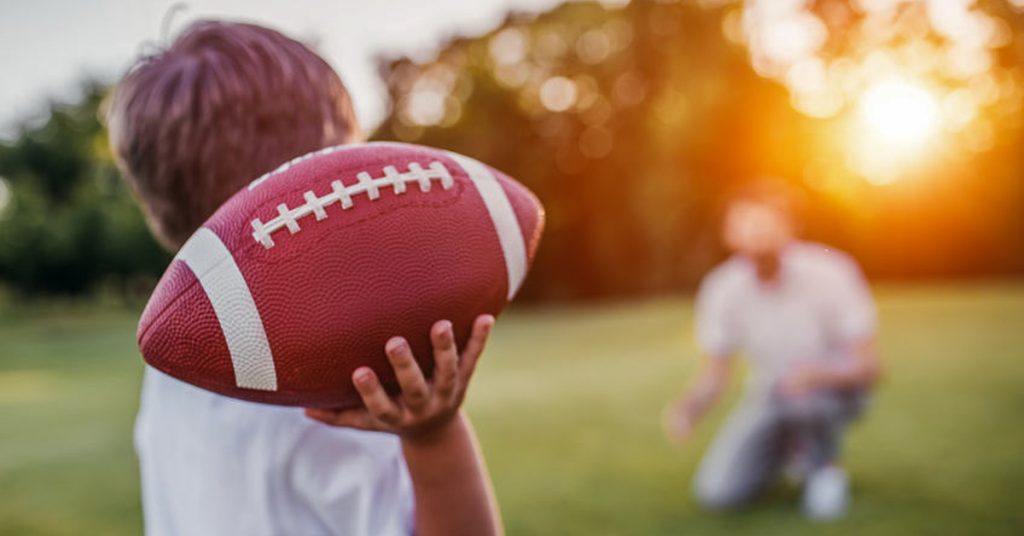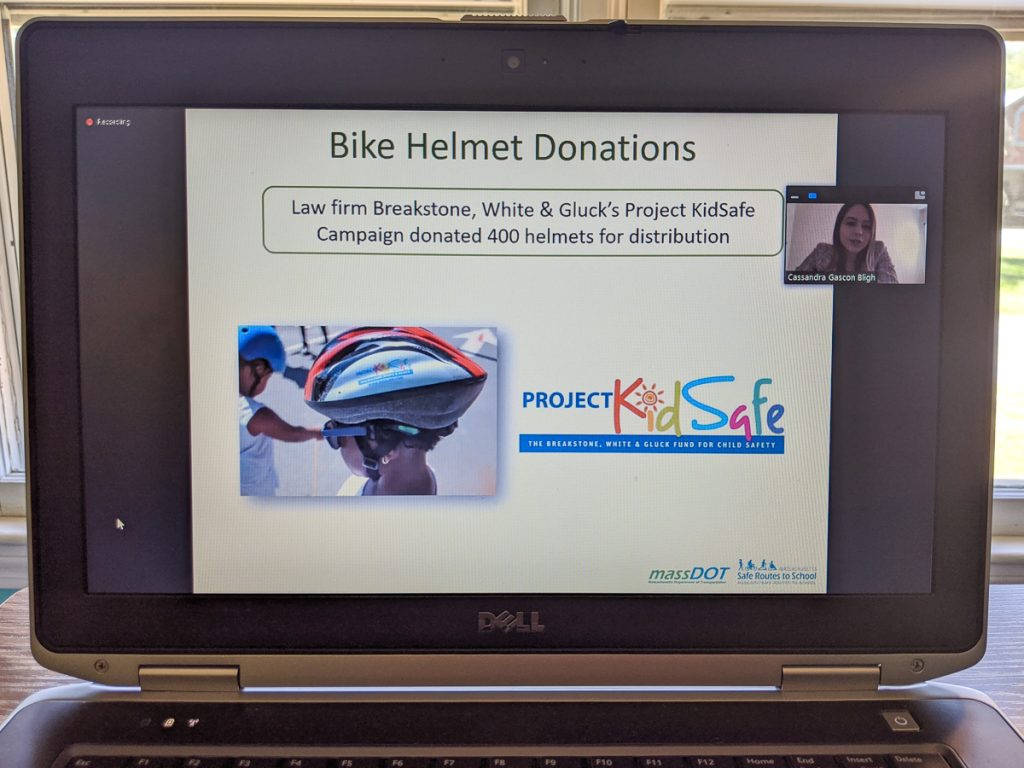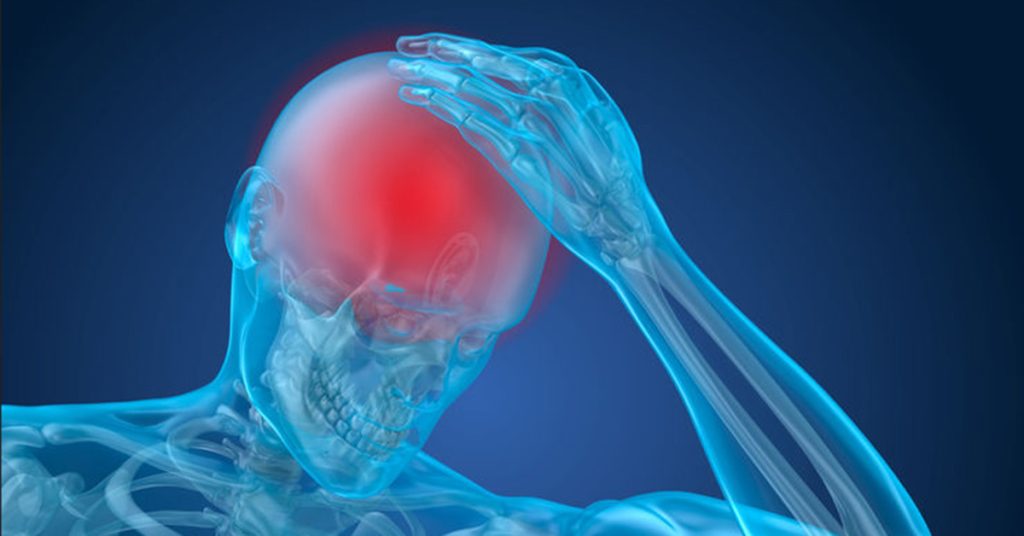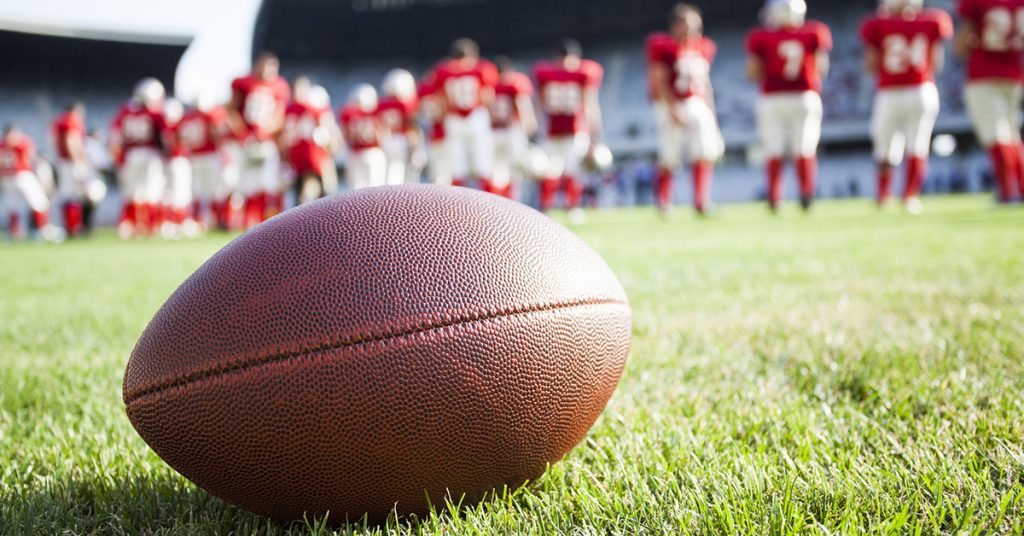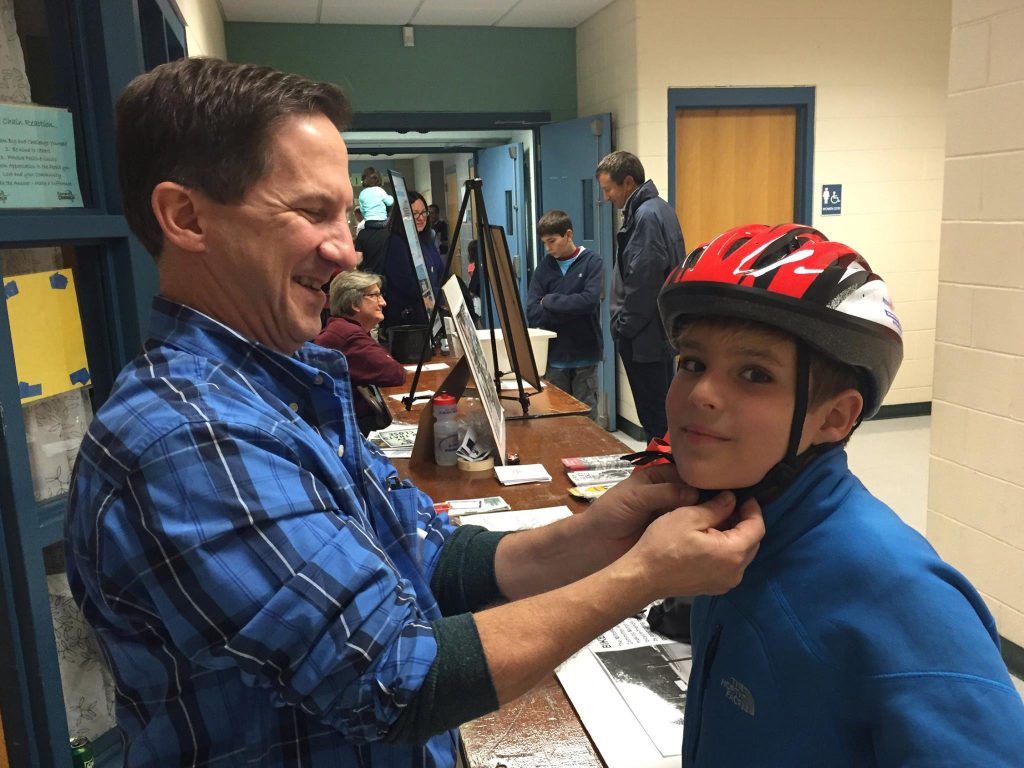Brain Injury
Brain Injury Awareness Month: Would You Recognize the Symptoms of a Concussion?

After a car accident is a critical time to seek medical care and screening for a concussion.
March is Brain Injury Awareness Month. Nearly 12 years ago, Massachusetts lawmakers passed legislation to develop a concussion safety program for high school athletes. Before they play, student-athletes and their parents must now learn about concussion symptoms. If students are injured, they must follow step-by-step guidelines for recovery. The goal is to make sure students fully heal from concussions.
Just as students have learned about concussions, Brain Injury Awareness Month offers others a chance to learn.
These are essential lessons, helping us care for ourselves and our families. The sooner one identifies potential concussion symptoms, the sooner they can seek a medical evaluation and begin rest and recovery. Below, we write about concussions, symptoms and high-risk situations when one may consider seeking a medical evaluation as a precaution.
What is a Concussion?
A concussion is often called a mild traumatic brain injury or “mild TBI.” A concussion may follow a bump, blow or jolt to the head, or a hit to the body that causes the head and brain to move quickly back and forth, according to the Centers for Disease Control and Prevention (CDC).
There may be no visible bruising, skull fracture or head injury, but the sudden movement can impact the brain’s function.
When one suffers a concussion, they may experience a range of symptoms impacting their health. It can be very difficult to read the symptoms, which may include one or more symptoms:
- headaches
- memory loss
- feeling groggy
- difficulty sleeping (or sleeping too much)
- mood and behavior changes
- balance problems
- slurred speech
- dizziness
- nausea or vomiting
- confusion
- decreased coordination
- sensitivity to light
- irritability
- In adults, one pupil may appear larger than the other.
Symptoms may appear right away or in the hours after a concussion, or they may be delayed a few days and weeks.
One misconception is a person will lose consciousness if they suffer a concussion. This is not always true. In fact, on the sports field, one coach said athletes only lose consciousness in about 10 percent of all concussions cases (Source: Heads Up Video: What is a Concussion?, CDC).
When to Consider Seeking Medical Care
As important as it is to learn about concussion symptoms, there are also times when you should just receive medical care as a precaution. This includes after children’s injuries, sports injuries, car accidents, falls or bicycle accidents.
Children and Student-Athletes

Respond promptly if you suspect your child has sustained a concussion.
Start learning now before you suspect a possible injury. Look to your child’s pediatrician and school for information on concussion prevention, symptoms and how to respond to a potential concussion. This is important because your child’s brain is going to support them throughout their life and by understanding a few basics, you can minimize their risk of suffering an injury. But if your child does suffer a concussion at some point, what you learn now will help you be ready to help them receive care and fully heal before they start their full routines up again. To help you get started, read our page on the Massachusetts sports concussion safety law and helmet laws for children. Another resource is the CDC Heads Up web page.
Motor Vehicle Crashes
Motor vehicle crashes are a leading cause of concussions and traumatic brain injury. The violent force of a collision can cause many injuries, from whip-lash to broken bones and head injuries. One can suffer a concussion in crashes at any speed and unlike other types of injuries, see no visible signs. One does not have to hit their head to sustain a concussion.
It can be hard to know whether you were injured after a car accident, so it is best to be proactive and call your primary care physician or visit a hospital emergency room.
Falls
When someone falls and hits the ground, they can suffer a concussion and it may be hard to recognize the signs, especially if the person is alone.
Older adults and younger children are more vulnerable to suffering falls. They are also at the highest risk for going without treatment. Consider how difficult it is for many adults to recognize they may have suffered a concussion; then think about young children, who may have limited speech. When it comes to young children, look for signs of discomfort, such as constant crying, trouble sleeping or the child may not eat. Contact your child’s pediatrician so they can advise you on the next step.
As for older adults, the CDC reports more than 34,000 adults age 65 and older died in falls in 2019. Many of these falls involved TBI and broken bones.
If you have an older relative or friend, talk to them about the importance of seeking medical care after any type of fall. Immediate treatment can help them identify whether they have sustained a concussion or other injuries. This puts their primary care physician in a good position to help them manage their recovery, with their full understanding of the person’s medical conditions and what medications they take.
Bicycle-Related Head Injuries
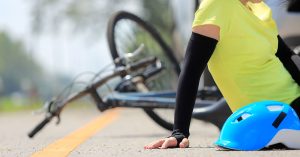
Cyclists can suffer many serious injuries in a crash. Always visit a hospital emergency room as a precaution.
Make a plan for safety. Should you ever fall on your bike or be involved in a bicycle accident, commit to seek immediate medical care right away. Have a doctor evaluate whether you sustained a concussion.
Medical care is critical for cyclists. In addition to concussions, cyclists are vulnerable to suffering broken bones around the face, jaw and fractured teeth in crashes, along with other injuries. While you may try to treat your own pain, a medical exam is the best first step to determine the source of all your swelling and injuries.
As a cyclist, you can take an important step and protect against head injury by wearing a helmet. When cyclists wear helmets, the reality is they may still suffer injuries in a collision. But cyclists are more likely to survive a bike crash without the cognitive, physical or mental complications of a severe and traumatic brain injury. This is critically important because it improves one’s long-term chances for making a full recovery.
According to the CDC, helmets reduce the risk of head injury by absorbing much of the impact energy from a fall or a bicycle accident. Helmets protect the skull and brain from more severe injury.
After a Concussion, The Importance of Follow Up Medical Care
Another time to consider medical care is in the days, weeks and months following your initial treatment for a concussion. It is important that you fully heal. If you suffer a second concussion while you are still recovering, you are at risk for second impact syndrome and long-term complications.
The CDC reports many concussions are not fatal. Many people recover from concussions within a few weeks, with rest, plenty of sleep and patience.
But some injuries take more time. The National Institute of Health reports one study found nearly a quarter of patients struggle with physical and mental problems related to a concussion a full year later. Another study tracked 831 patients at 11 major trauma centers across the country and found not every patient receives follow-up care.
- Within three months of their injury, fewer than half of the patients – 44 percent – had followed up with a health care professional.
- Notably, when patients visited medical centers with dedicated TBI clinics, they were more likely to receive follow-up care.
- Patients who had more serious injuries (those who had CT Scans that showed tissue damage) had a higher rate for follow-up care, but even then only 61 percent sought follow-up care.
There are many reasons patients may not follow up after a concussion. This study noted just 42 percent of patients received educational materials as they left treatment; just 27 percent received a follow-up call from the hospital.
Make it your priority to follow up with your primary care doctor for as long as it takes.
Follow your doctor’s instructions for every phase of your recovery: when you are ready to drive and go back to work. Follow any limits your doctor sets, such as restricting cell phone use.
Take the family member along to your doctor’s appointments. This gives your loved one a chance to learn about the symptoms of a concussion and how you should progress.
Ask a loved one to play an active role in your treatment and help you observe your recovery. You may need help tracking activities at times, such as how many hours you sleep or how many times you contact your doctor with concerns. Write down any medical instructions you receive, or print messages from your online medical records, so you and your loved one can review them together over the next few months.
Free Legal Consultation – Boston TBI Attorneys
At Breakstone, White & Gluck, our Boston personal injury lawyers have over 100 years combined experience representing those who have been seriously injured or killed by the negligence or wrongdoing of others.
Our lawyers have extensive experience representing clients who have suffered concussions and traumatic brain injuries as a result of someone else’s negligence, helping them recover compensation for their medical expenses, loss of future income and other damages.
Our attorneys represent clients in Boston, Cambridge, Arlington, Somerville, Everett, Quincy, Milton and across Massachusetts. If you have been injured, learn your legal rights. For a free legal consultation, call 800-379-1244 or 617-723-7676 or use our contact form.
Brain Injury Awareness Month: Simple Steps You Can Take to Protect Your Children

March is Brain Injury Awareness Month, a good time to ask if you or your children need a new bicycle helmet.
Each March, the Centers for Disease Control and Prevention (CDC) observes Brain Injury Awareness Month to highlight new research on injury prevention.
This is a good time for parents to reflect upon what you can do to protect yourselves and your children from a concussion. To start, you can purchase a bicycle helmet for your child and buckle them up in an age-appropriate car seat. Before you sign up for youth sports, really learn about the activity and consult your child’s pediatrician. The CDC recently shared this study, which suggests non-contact or flag football programs may be safer for children under 14 because there are fewer head impacts.
You can also commit to learn how to recognize the symptoms of a concussion so you can properly respond and seek medical attention for your child. This is an ongoing learning process which gets stronger, through conversation with your pediatrician, your child’s school and with your own family members.
Wear a Helmet. In Massachusetts, your child is required to wear a protective helmet while riding a bicycle or scooter. Read our blog, “How to Fit a Bicycle Helmet.” We also share some resources on Massachusetts helmet laws at the bottom of this webpage.
Massachusetts Concussion Protocol for Students. Before each season, your child’s middle or high school has a responsibility to share information about the Massachusetts youth sports concussion law with you.
Massachusetts law requires schools to develop concussion safety programs and provide training for students, parents, coaches and others on how to identify concussion symptoms. Schools must also explain the protocol for removing a student who has been injured from play.
Students suspected of having a concussion must see a doctor and must receive a doctor’s note before returning to practice or a game. It is essential to understand just how your school or coach will communicate with you.
No one ever wants to think about their child possibly suffering an injury. But the state protocol is largely about taking steps to prevent an injury and how to identify potential injuries. This is essential reading that will help you protect your child. Take time to read if even if you have already seen these materials in the past. Also take time to share and discuss this information with your spouse, baby sister or family members who care for your child.
Learn more about the Massachusetts concussion guidelines for student athletes and the CDC’s Heads Up Concussion page.
Commit to Watch for Symptoms. There are some situations when it is clear a parent should seek medical attention for their child. For instance, if your child’s school alerts you or if your child was injured in a car accident, those are your warnings.
However, the symptoms of a concussion may be less clear when children are injured while playing at home or other situations. To help you learn the signs, we have compiled a list of physical, emotional and sleep-related symptoms which may indicate you should contact your child’s pediatrician on our concussion webpage. These are compiled from the CDC web page on concussion symptoms.
Please consider the symptoms collectively, along with your child’s recent activities on the sports field or playing at home or with friends. If you have reason for concern, make the decision to contact your child’s pediatrician or visit the emergency room.
Free Legal Consultation – Boston Personal Injury Lawyers
At Breakstone, White & Gluck, our personal injury lawyers have extensive experience representing those who have suffered concussions, second-impact concussions and brain injuries. Over the past three decades, our attorneys have counseled and guided many clients to the financial results they need to recover from these complex injuries. For a free legal consultation, contact us at 800-379-1244 or 617-723-7676.
In addition to our work, Breakstone, White & Gluck works to help children and families protect against head injuries through our Project KidSafe campaign. We have proudly given away more than 30,000 bicycle helmets to children across Massachusetts.
Fewer Children Visiting Hospitals for Sports-Related TBI
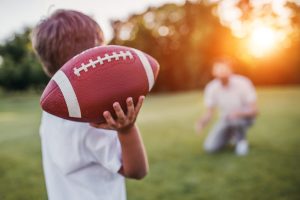
There has been a drop in child sports-related TBI visits to ERs, according to the CDC.
According to new research, fewer children are visiting the hospital for sports and recreation-related traumatic brain injuries. This is being largely driven by changes on the football field.
After a decade of rising injuries and the passage of state concussion laws, fewer children have been participating in youth football, contributing to the reduction in injuries. Going forward, the researchers are focusing on studying safer play techniques which could limit contact in football. They will also continue investigating head injuries in other sports, such as soccer and basketball, where the numbers didn’t change significantly.
The Centers for Disease Control and Prevention (CDC) released the research in a recent weekly report. Researchers analyzed data from the National Electronic Injury Surveillance System-All Injury Database.
What the Researchers Learned
The number of children visiting the hospital for sports and recreation-related traumatic brain injuries fell 32 percent from 2013 to 2018.
Researchers attribute this to changes in youth football programs across the U.S. Since 2010, participation has fallen 24 percent. Meanwhile, there was a 39 percent decline in football TBI visits from 2013 and 2018.
This was an encouraging sign. Previously, from 2001 to 2013, there had been a 200 percent increase in children suffering football-related traumatic brain injuries and ER visits. This was among children age 5-17.
While football-related TBI ER visits decreased, there was not significant movement in TBI ER visits for basketball and soccer, two other contact sports.
The CDC and researchers are also studying safer tackling techniques in football. Several sports leagues have also introduced new approaches which limit contact during practice. These include the National Federation of State High School Associations and its member states, along with two major youth football programs.
Concussions and Traumatic Brain Injuries
According to the CDC, a TBI is caused by a bump, blow or jolt to the head. It may be a penetrating head injury that disrupts the brain function. A concussion is a “mild” traumatic brain injury. A concussion may lead to brief changes in mental function and consciousness. Those injured may not realize they have a concussion and learning to recognize potential symptoms can save their life.
When it comes to your child, physicians, pediatricians, schools and caregivers have a responsibility to follow certain steps if they play sports and suffer a concussion or repeated concussions.
Massachusetts Concussion Protocols: Preventing Injuries and Caring for Students
CDC researchers noted that many children can recover from a sports and recreation-related TBI within 4 weeks. However, there is a continued focus on reducing long-term effects on a child’s brain development. Recovery must be carefully monitored.
Massachusetts and other states have passed laws to guide schools and sports leagues on how to prevent and treat injuries. Schools, leagues and coaches have a responsibility to follow the concussion protocols.
In Massachusetts, schools must provide students with training on how to recognize a concussion. Students must be removed from play if a concussion is suspected. They can only return with a doctor’s note. Read more about the Massachusetts concussion protocol on our website.
About Breakstone, White & Gluck – Boston Concussion Lawyers
Breakstone, White & Gluck and our Boston head injury lawyers represent clients after traumatic brain injuries and concussions caused by negligence. If you or a loved one has been injured, receive medical attention right away. Then, learn your legal rights.
For a free consultation with one of our lawyers, call 800-379-1244 or 617-723-7676. You can also use our contact form.
Breakstone, White & Gluck’s Project KidSafe Campaigns Supports Boston Area Police Departments
In June, Breakstone, White & Gluck and our Project KidSafe campaign were pleased to donate children’s bicycle helmets to the Quincy Police Department, Brockton Police Department and the Braintree Police Department.
Read about our donation to Quincy Police in the Quincy Sun newspaper.
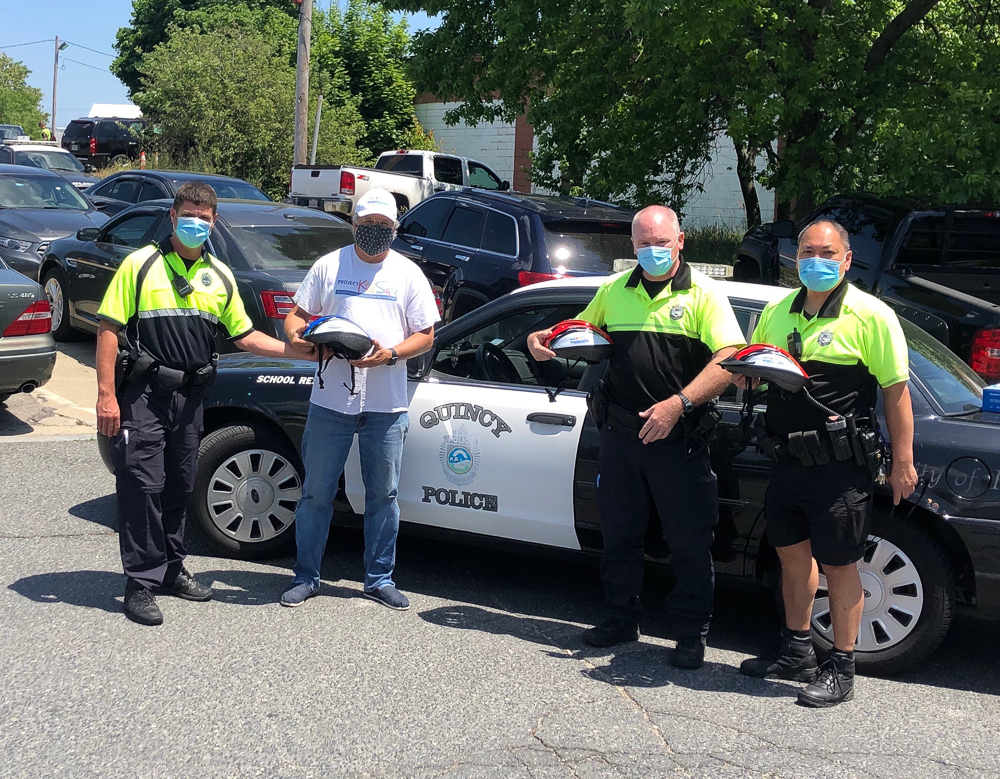
Breakstone, White & Gluck donated 200 children’s bicycle helmets to the Quincy Police Department, for distribution to local children in 2020. Pictured (L-R): Officer G. Hartnett, Atty. David White, Officer Whedbee and Officer Mar. Photo Courtesy Quincy Police Dept.
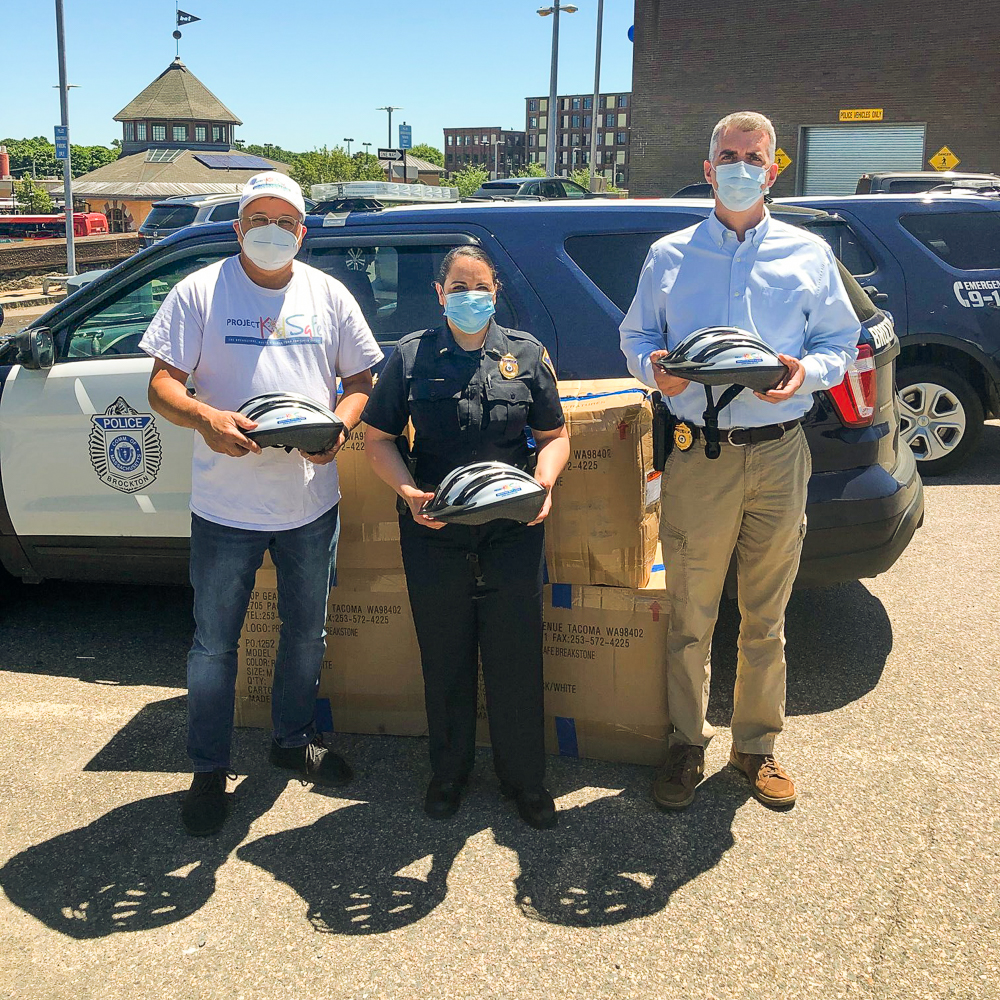
PHOTO COURTESY: Brockton Police Facebook– (From left:) Attorney David W. White, with Brockton Police Lt. Brenda Perez and Sgt. Will Schlieman
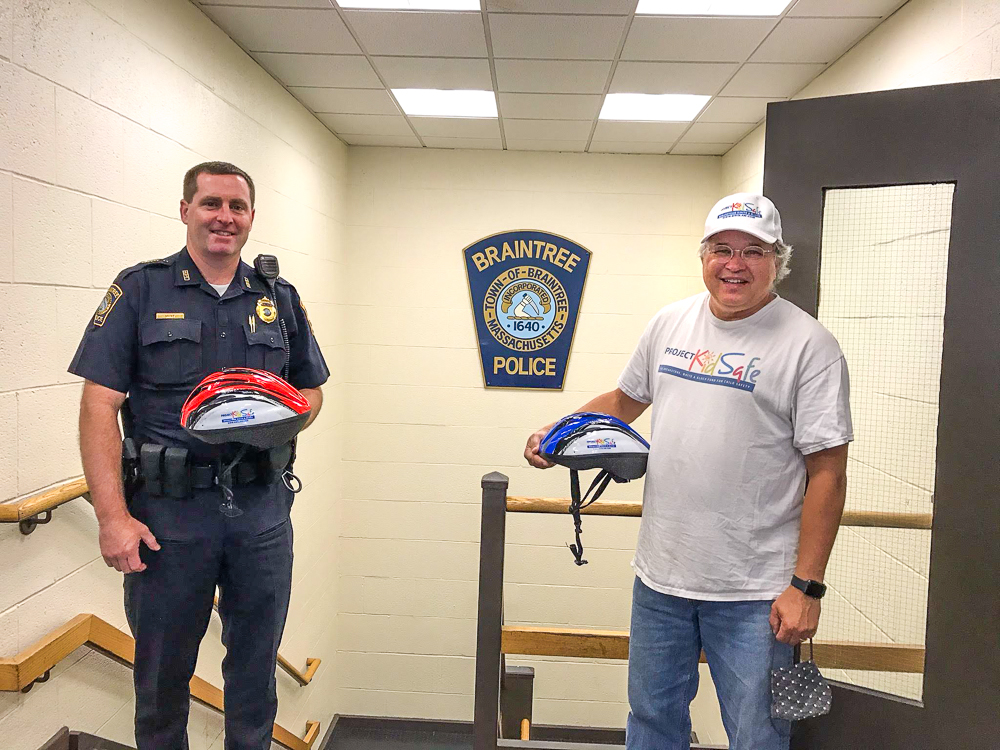
Left to right: Braintree Police Deputy Chief Michael Want receives Project KidSafe bicycle helmet donation and Attorney David W. White of Breakstone, White & Gluck.
About Breakstone, White & Gluck & Project KidSafe
Breakstone, White & Gluck is a top-rated Boston personal injury law firm serving all of Massachusetts. Our attorneys founded our Project KidSafe campaign in 2013, with a goal of protecting children from head injuries. Toward that goal, we have now donated 30,000 bicycle helmets to children in the Boston area, with help from more than 50 community partners.
Under Massachusetts law, cyclists who are 16 and younger are required to wear helmets to protect themselves. To learn more, we have posted a video and other materials on our website: www.bwglaw.com/project-kidsafe/.
Learn more about Breakstone, White & Gluck and our Project KidSafe campaign.
Massachusetts Safe Routes to School Recognizes Project KidSafe Bike Helmet Donation
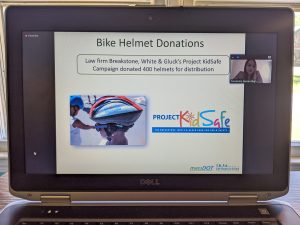
For the 6th year, Breakstone, White & Gluck and our Project KidSafe campaign are pleased to support Massachusetts Safe Routes to School. Once again, our attorneys have committed to donating 400 bicycle helmets to Safe Routes. From there, the Safe Routes coordinators will give the helmets to low-income children who want to participate in bike safety training and bike rodeos.
This morning, Massachusetts Safe Routes to School held its annual awards ceremony to honor schools and teachers which have excelled in reaching their walking and biking goals for children. Stephanie Pollack, secretary and CEO of the Massachusetts Department of Transportation (MassDOT), was the featured speaker. Before announcing the awards, Massachusetts Safe Routes to School thanked Breakstone, White & Gluck for our donation.
This is Massachusetts Safe Routes to School’s 15th anniversary. For those who don’t know, Massachusetts Safe Routes to School is a federally funded initiative of the MassDOT. Over 15 years, it has offered biking and pedestrian safety program to children in 237 communities and reached more than 420,000 students. Schools are committed to the programming. Safe Routes now has 920 partner schools. View this year’s awards list.
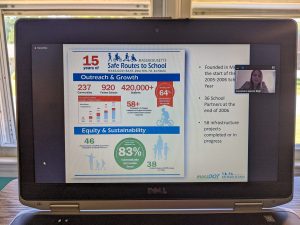 About Breakstone, White & Gluck – Commitment to Bike Safety
About Breakstone, White & Gluck – Commitment to Bike Safety
The Boston personal injury lawyers at Breakstone, White & Gluck are committed to safety and preventing head injuries. Through our Project KidSafe campaign, we have donated 30,000 children’s bicycle helmets across Massachusetts. We founded our campaign in 2013 and have since partnered with Massachusetts Safe Routes to School, local police departments, bicycle committees and community groups. Our goal has been to work with community partners who really care and are committed to bicycle safety and preventing head injuries.
In Massachusetts, cyclists under age 17 must wear bicycle helmets. But every cyclist is encouraged to wear a helmet. We hope you are never injured on a bike, but you can recover from many injuries. Head injuries can be fatal and it is important to protect yourself.
Commit to wear a bicycle helmet every time you ride. Helmet use has been estimated to reduce the chances of head injury by 50 percent and the chances of head, face or neck injury by 33 percent, according to the Insurance Institute for Highway Safety.
March is Brain Injury Awareness Month
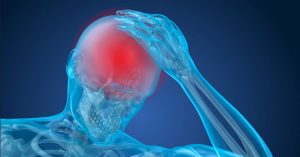
March is Brain Injury Awareness Month. Take the opportunity to learn
Today, there is greater awareness around brain injuries. As a result, many people are treating brain injuries earlier and living healthier lives.
The Centers for Disease Control and Prevention (CDC) observes Brain Injury Awareness Month in March, to provide education about potential concussion symptoms, ongoing research and the needs of those living with a brain injury. This comes at the right time for families, as many children and teenagers plan to participate in spring sports.
Many brain injuries are caused by car accidents, falls or violence. But over the past decade, we have learned more about young children and student athletes suffering concussions on the sports field. In fact, from 2010 to 2016, nearly two million children were treated in emergency rooms for sports-related traumatic brain injuries (TBI), according to the CDC website. Sports associated with the highest number of ER visits: football, cycling, basketball, playground activities and soccer.
Among males 17 and younger, football was involved in 27 percent of all sports-related TBI visits to the ER, more than any other activity. In the same age group, females playing soccer, playground activities and basketball made the highest number of ER visits for TBI. Among children under 5, playground activity resulted in the most ER visits for TBI.
As we continue learning about injuries to children and student athletes, research continues to show older Americans are highly vulnerable to brain injuries. They are the most likely to be hospitalized for TBIs, according to the CDC.
At Breakstone, White & Gluck, our attorneys encourage you to look at the CDC website so you can be informed about the symptoms of traumatic brain injury and concussion. If you observe symptoms in yourself or your children, immediately call your doctor to be examined. Also guide older family members to medical treatment. This is paramount because a brain injury left untreated can result in long-term impairment or death. When someone receives immediate treatment, effective diagnosis and management early on is critical.
What is a Traumatic Brain Injury?
According to the CDC, a traumatic brain injury can be caused by a bump, blow or jolt to the head. There are traumatic brain injuries and mild traumatic brain injuries, which are often called concussions.
What are the Symptoms of a Traumatic Brain Injury?
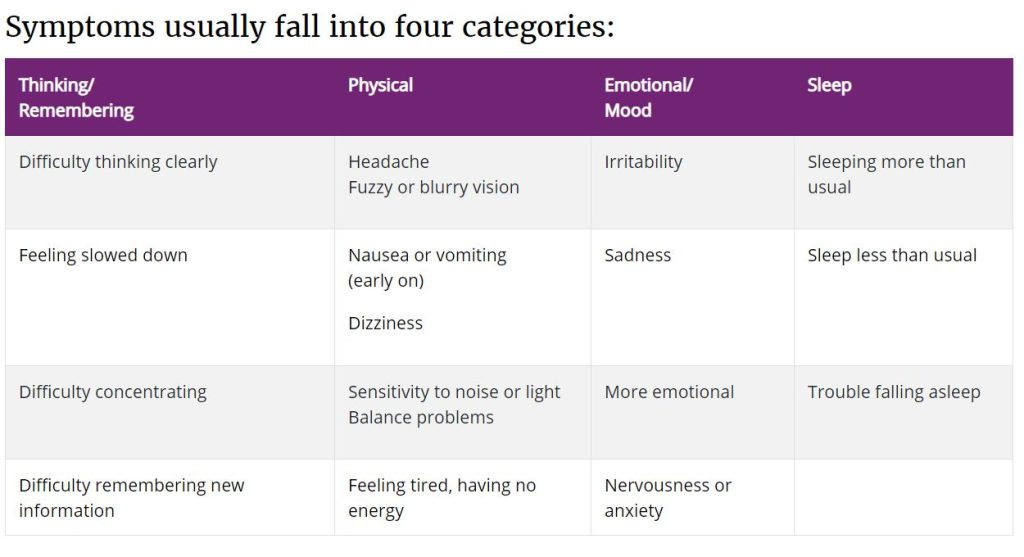
Concussion Symptoms. Courtesy CDC Website
You may observe some of these symptoms immediately after someone sustains a brain injury. Or symptoms may not emerge for several days. It’s also important to note that not everyone experiences the same symptoms.
Symptoms include difficulty thinking, concentrating or remembering or feeling slowed down.
Physical symptoms may include headaches, nausea, vomiting or fatigue. Some people are sensitive to noise or light. Others have trouble balancing themselves.
When someone suffers a head injury, it’s common for their sleep to be disrupted. They may sleep more or less than normal. Another sign is having trouble falling asleep. More extreme emotions are another symptom. The person may be irritable, sad, more emotional or exhibit high anxiety and nervousness.
Younger children may exhibit some of the above symptoms, but parents should also watch for crying inconsolably, more temper tantrums or getting easily upset and having trouble keeping up with skills they are learning (toilet training for instance). They may also lack interest in their normal activities.
Sports-Related Concussions and TBI in Massachusetts
Be aware of how concussions happen. After a car accident or truck accident, always receive immediate medical attention to make sure you have not suffered a TBI. When an elderly relative slips or a child falls on the playground, check in with the doctor. Do this anytime you observe someone suffer from any type of physical impact to the head.
When you sign your child up to play a sport, ask the coaches for the concussion protocol. In Massachusetts, middle and high schools are required to have documented procedures regarding concussion injuries and prevention. Passed in 2010, M.G.L. c.111 § 222 requires parents and students to participate in concussion awareness training so they can recognize symptoms and receive early treatment. The law also requires students to be removed from play if they may have suffered a concussion. They can only return with medical clearance.
Under the law, public middle and high schools and those subject to Massachusetts Interscholastic Athletic Association (MIAA) regulations must have concussion protocols. Other sports leagues are not required under Massachusetts law, but they should all have a concussion policy on their website.
Final Note
- At home, educate older children about TBI symptoms. Ask them questions when you sense something may be off and use the above chart to determine whether you may need to call the doctor.
- Ask for concussion safety protocols at schools and daycare centers, and when children participate in sports leagues. Attend concussion trainings.
- Watch younger children and older adults closely. Remember young children may not be able to communicate symptoms and pain with you and older adults may not recognize symptoms in themselves, especially if they have other medical conditions.
- Recruit as many family members as you can in watching for signs in young children, teens and the elderly.
- Visit some of the online resources below and share them with family members.
Concussion Prevention Resources for Families
Massachusetts Law on Concussion Prevention in Sports
105 CMR 201.00: Head injuries and concussions in extracurricular activities
Additional Resources
Heads Up to Brain Injury Awareness Training, CDC
Facts About Concussion and Brain Injury – Where to Get Help, CDC (a resource for all ages)
Sports Related Concussions and Head Injuries, Mass.gov
Concussion Trainings, Massachusetts Department of Public Health
Returning to School After a Concussion, Mass.gov
About Breakstone, White & Gluck – Boston Personal Injury Lawyers
With more than 100 years combined experience, Breakstone, White & Gluck of Boston is one of the most respected personal injury law firms in Massachusetts. Our attorneys represent individuals who have suffered traumatic brain injuries or mild traumatic brain injuries due to the negligence of another individual, organization or corporate entity.
If you have been injured, learn your legal rights for seeking financial compensation and obtaining medical care. For a free legal consultation, call Breakstone, White & Gluck at 800-379-1244 or 617-723-7676 or you can use our contact form.
Massachusetts Concussion Legislation Would Ban Students In Grade 7 or Younger from Playing Football
Should students have to wait until they finish 7th grade to play football in Massachusetts? Lawmakers are being asked to consider legislation to delay the start of play to protect players from concussions.
“An Act for No Organized Head Impacts to Schoolchildren,” has been filed by State representatives Paul A. Schmid III (D-8th Bristol) and Bradley H. Jones Jr. (R-20th Middlesex). The legislation would ban children in 7th grade or younger from playing or practicing any form of organized tackle football. Schools would be held accountable and face fines for violations:
- $2,000 for each violation
- $5,000 for subsequent violations
- $10,000 when serious physical harm result to participants
Children would be allowed to play flag football or any form of football which does not involve tackle play. The proposal does not include any other sport.
Causes of Concussions
The Centers for Disease Control and Prevention (CDC) define a traumatic brain injury (TBI) as a disruption to the brain caused by a blow or jolt to the head. Concussions are considered a mild TBI, which can result in a brief change of mental alertness or consciousness. A severe TBI can result in a longer period of unconsciousness or mental change.
Symptoms may not be immediately evident after a concussion, especially if the person or those around them are not familiar with the symptoms, which can include an inability to think clearly, memory problems, feeling dazed and mood, behavior or personality changes. Headaches, nausea and vomiting can also set in.
Beyond the sports field, falls are the leading cause of concussions, according to the CDC. Adults over age 65 and children under 14 are most likely to suffer a fall leading to a head injury. Car crashes are the third leading cause of concussions, followed by being struck in the head by an unspecified object, such as in a construction site accident or by violence.
Concussions can also happen on the sports field. Not every contact necessarily results in a concussion, but to identify injuries, Massachusetts and other states have already passed concussion education and training laws. Known as “return to play” laws, these require high school and middle school students to be examined by a medical professional before they can participate in sports again.
Research on Concussions and the Impact on Younger Football Players
New research shows there is a measurable impact when younger children play football. In a study of 26 football players – all age 12 – Wake Forest researchers found changes in the corpus callosum, which joins the two sides of the brain and integrates cognitive, motor and sensory functions. The players underwent MRIs to examine the changes prior to the three-month season and three months after the season concluded. They were compared to 22 other students who did not participate in contact sports.
Players who suffer a concussion need proper rest and treatment so they can properly heal and to reduce the chance for another injury. Researchers have documented this risk; one study found high school and college students who sustained concussions were four to six times more likely to suffer a second injury (Source: McGill University in Montreal).
Concussion Legislation Filed in Other States
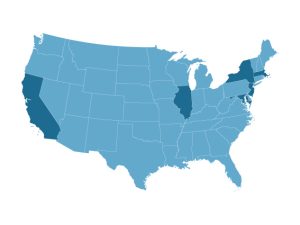
Lawmakers in Massachusetts and five other states have proposed banning tackle football for children younger than 12 or for those in seventh grade or younger. Data from Shape America.
Massachusetts isn’t taking the field alone on concussions. At least five other states are also debating tackle football bans for children under age 12. These states include Illinois, California, Maryland, New York and New Jersey, according to Boston.com. But none of the proposals are on track to reach state governors.
All 50 states already have “return to play” laws aimed at reducing youth sports-related concussions, according to the National Conference of State Legislatures. Washington state was the first to pass such a law in 2009. By 2015, every other state had enacted a similar law.
In most states, these laws mandate concussion awareness training and education to prevent concussions among student athletes. According to Shape America, 48 states require students suspected of having concussions to sit out at least 24 hours.
Arizona and South Carolina allow students back on the field the same day with a doctor’s approval.
Passed in July 2010, the Massachusetts concussion law requires parents, volunteers, coaches and school nurses to receive specialized concussion awareness training. This is to help them recognize concussion symptoms and help students receive treatment as soon as possible.
As in other states, the Massachusetts law requires medical clearance before students can return to sports. Schools are then required to maintain detailed record-keeping related to a student’s injury and progress in the classroom and on the field. The law is M.G.L. ch.111 §222. The Code of Massachusetts Regulations is 105 CMR 201.000.
All middle and high schools which offer sports through the Massachusetts Interscholastic Athletic Association (MIAA) must follow the concussion safety law.
Breakstone, White & Gluck Donates Children’s Bicycle Helmets in Milton and Westwood
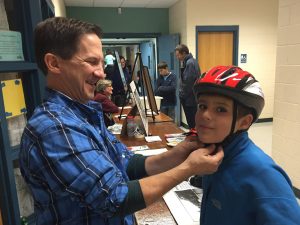 Breakstone, White & Gluck cares about bicycle safety in Boston and across Massachusetts. Over the past four years, our attorneys have donated brand-new bicycle helmets to children who need one through our Project KidSafe campaign.
Breakstone, White & Gluck cares about bicycle safety in Boston and across Massachusetts. Over the past four years, our attorneys have donated brand-new bicycle helmets to children who need one through our Project KidSafe campaign.
Wearing a helmet is the most effective step a cyclist can take to prevent a brain injury in a car accident or fall on a bicycle. While important for all cyclists, wearing a helmet is especially important for children, who are still growing and in development.
Breakstone, White & Gluck is nearing the end of the fourth year of our Project KidSafe campaign. Since 2013, our campaign has donated over 10,000 new bicycle helmets to children who needed one. Along the way, over 40 community groups, bicycles safety organizations, police departments and schools have pitched in to help us protect children. Many of these groups help us year in and year out.
We had our busiest year yet in 2016, donating over 4,000 children’s bicycle helmets. Here are a few of our recent donations. We thank our partners Bike Milton and the Westwood Pedestrian & Bicycle Safety Committee.
Bike Milton
Breakstone, White & Gluck recently donated 100 children’s bicycle helmets to Bike Milton, the town of Milton’s bicycle committee (photo above).
On Oct. 2, the Bike Milton distributed bicycle helmets to children at Celebrate Milton, and showed children and parents how to properly fit the helmets. Bike Milton also gave away free bike maps and shared information about the town’s new bike lanes. The Neponset River Greenway extension is also opening soon, which will allow cyclists to ride safely on a protected path. The path runs through Milton, Dorchester and other communities near Boston.
Bike Milton is an active partner of the Safe Routes to School program, which works in schools across the state to teach children how to ride bikes and walk to school safely (Breakstone, White & Gluck is also a supporter of Safe Routes).
Bike Milton is an advocate for safety and has campaigned to make the intersection of Neponset Valley Parkway, Brush Hill Road and Milton Street safer for drivers, cyclists and pedestrians. The intersection had no crosswalks and saw 34 reported accidents over an 8-month period. Visit their website to learn more.
Westwood Pedestrian & Bicycle Committee
For the third year, Breakstone, White & Gluck donated bicycle helmets to keep the children of Westwood safe. Our thanks to the Westwood Pedestrian and Bicycle Committee, which distributed helmets to children at Westwood Town Day on September 24th. Committee members also spoke to families about the importance of wearing a helmet on every bicycle ride.
Attorney David White of Breakstone, White & Gluck is a member of the Westwood Pedestrian and Bicycle Safety Committee, but was unable to attend this year. The committee said all still went smoothly and they distributed over 100 helmets in three hours.
Tips for Fitting a Bicycle Helmet
Questions about bicycle helmets? Visit our bicycle safety page.
About Breakstone, White & Gluck
Breakstone, White & Gluck, a Boston personal injury law firm, is committed to the safety of all bicyclists in Massachusetts. We have over 100 years combined experience representing bicyclists injured by the negligence of others. If you, or a member of your family, has been injured in a bicycle incident, please feel free to contact us for a free legal consultation at 800-379-1244 or 617-723-7676 or use our contact form. Thank you and RIDE SAFE!
Breakstone, White & Gluck Donates 100 Children’s Bicycle Helmets to Randolph Police
Breakstone, White & Gluck recently teamed up with the Randolph Police Department to help children ride their bikes safely and prevent serious head injuries.
We were pleased to donate 100 bicycle helmets to Randolph Police in August. Officers distributed the helmets to children who needed one at the Back to School Jamboree. The event was hosted by Randolph Public Schools and was held at the Randolph Community Middle School.
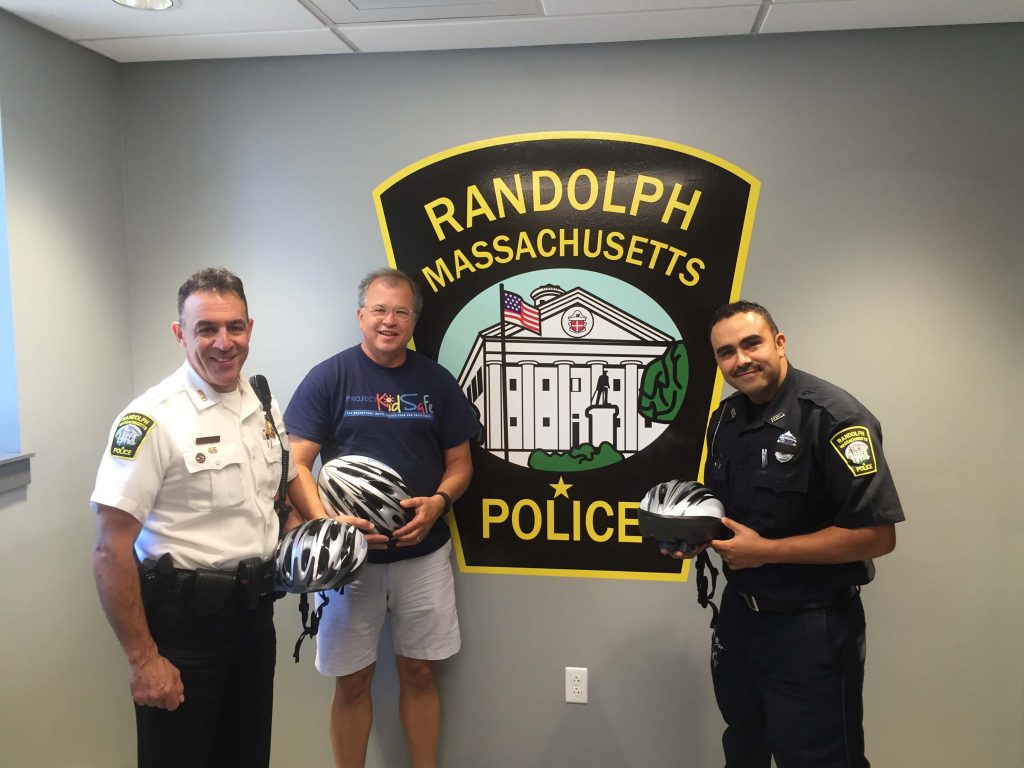
Photo: Attorney David White delivered bicycle helmets from our Project KidSafe campaign to Randolph Police Commander John Hamelburg and Officer Miguel Cruz.
As part of this event, Randolph Police Officer Kevin Donnelly and Sergeant Jeffrey Chaplin showed children and parents how to properly fit the helmets and answered questions. The community showed it cares about bicycle safety; Randolph Police gave away all their helmets on that one day!
Project KidSafe
Breakstone, White & Gluck donated the bicycle helmets as part of our Project KidSafe campaign, which has donated over 10,000 bicycle helmets since 2013. Our goal is to protect children from serious head injuries in a bicycle accident or fall.
We want children (and all cyclists) to wear a bicycle helmet every time they ride. Helmets are required for cyclists under 17 years old in Massachusetts. When children ride without helmets, they are at risk for a concussion or a serious head injury which can even lead to death. Consumer Reports recently called bicycle helmets “one of the smartest purchases you can make.” We agree!
Studies have shown the risks:
- According to a study by the Insurance Institute for Highway Safety, 60 percent of the people who died in a bicycle accident were not wearing helmets in 2014.
- A 2016 study published by BMC Emergency Medicine reported that more than 286,000 people suffered bike-related head injuries from 2007 to 2011, more than in other sports, including football, which gets most of the attention.
Bicycle helmets are an important topic as children head Back to School. Children ride their bikes to school in many communities, in Massachusetts and across the country. Parents, please check to make sure helmets properly fit and are still in good condition. A helmet does not last forever; they must be replaced with wear and tear and as children grow.
About Breakstone, White & Gluck
Breakstone, White & Gluck is a Boston personal injury law firm which is committed to the safety of all bicyclists in Massachusetts. We have over 100 years combined experience representing bicyclists injured by the negligence of others. If you, or a member of your family, has been injured in a bicycle incident, please feel free to contact us for a free legal consultation at 800-379-1244 or 617-723-7676 or use our contact form. Thank you and RIDE SAFE!
Breakstone, White & Gluck Donates 300 Bicycle Helmets to Help Somerville Students Ride Safe
Attorney Marc Breakstone visited Somerville yesterday to help distribute new bicycle helmets to fifth-graders. But first he wanted to talk about their commitment to bicycle safety. “Is everyone ready to take a pledge?” he asked.
Click the video to watch:
For the third year, Breakstone, White & Gluck was pleased to donate 300 bicycle helmets to fifth graders in Somerville schools who completed the CYCLE Kids curriculum, which teaches bicycle riding and safety. Attorney Breakstone visited with about 60 students at the Dr. Albert F. Argenziano School at Lincoln Park and helped hand out the new bicycle helmets and certificates of completion for the CYCLE Kids training program.
Breakstone, White & Gluck is committed to helping children ride bicycles safely. Since 2013, we have donated over 10,000 bicycle helmets as part of our Project KidSafe campaign. Every year has brought a donation in Somerville, which actively promotes bicycle safety for children, through the schools, dedicated school resource officers and community organizations which promote safety events.
Our goal is simple: to encourage children to wear helmets and prevent head injuries in falls and bicycle accidents. Massachusetts law requires cyclists who are 16 years old and younger to wear bicycle helmets, though it is recommended for cyclists of all ages.
CYCLE Kids is a Cambridge non-profit organization which provides bicycle safety and nutrition curriculum for schools across the country. Locally, Cambridge and Somerville schools teach the curriculum in physical education classes.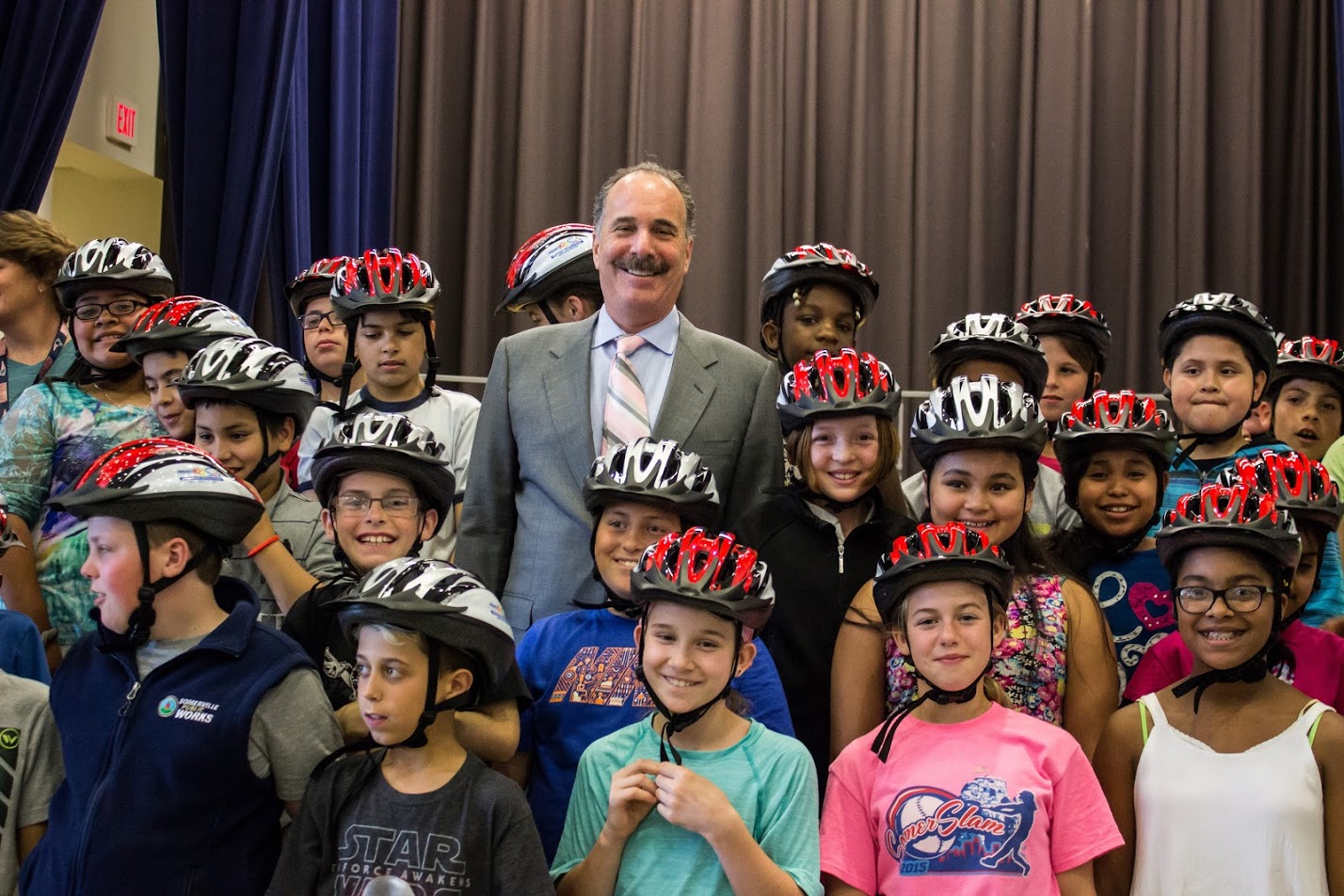
Attorney Marc Breakstone with the fifth-graders from the Dr. Albert F. Argenziano School in Somerville.
The Somerville fifth graders who completed the CYCLE Kids curriculum learned how to ride a bicycle, safety skills such as wearing a helmet and using hand signals and nutrition fundamentals. Students are also encouraged to share their experience – and any fears they have – through essay writing.
“It can be scary for the kids who don’t know how to ride,” physical education Kris Savage said. “It is a brave thing for them to ride in front of their peers.”
Breakstone, White & Gluck coordinated the donation with CYCLE Kids, Somerville Public Schools and Somerville Police Officer Marianne Manfra. Attorney Breakstone, Officer Manfra and Kris Savage, physical education teacher at the Argenziano School, handed out the new Project KidSafe bike helmets to the children.
This year, we learned one of the fifth-graders who received a new bicycle helmet had taken his own steps for bike safety for his school and classmates. Caleb Piehl won the Saris National Bicycle Poster Contest last fall. As part of his prize, he won a trip to the National Bike Summit in Washington D.C. in March, a new Scwhinn bicycle, safety gear and a great prize for the school: a new 20-rack bicycle parking system that can track users’ mileage.
About Breakstone, White & Gluck
Breakstone, White & Gluck is a Boston personal injury law firm which is committed to the safety of all bicyclists in Massachusetts. We have over 100 years combined experience representing bicyclists injured by the negligence of others. If you, or a member of your family, has been injured in a bicycle incident, please feel free to contact us for a free legal consultation at 800-379-1244 or 617-723-7676 or use our contact form. Thank you and RIDE SAFE!


